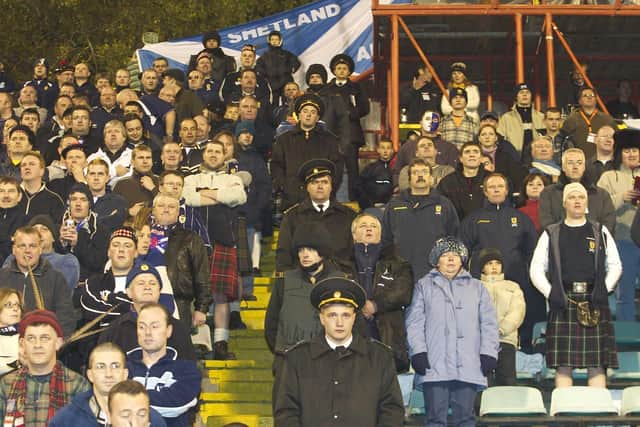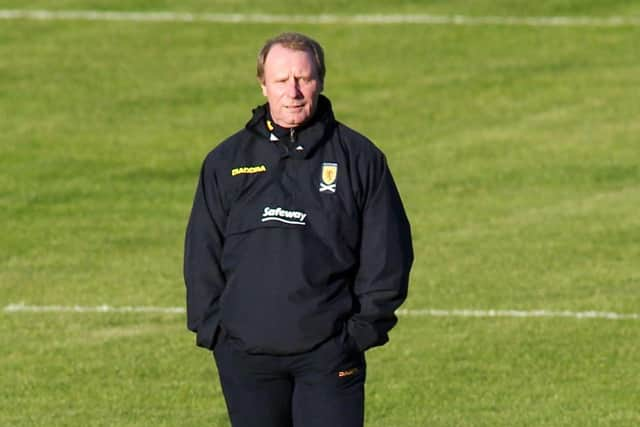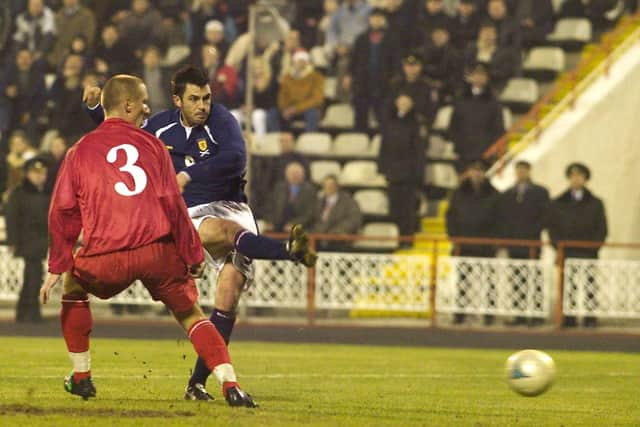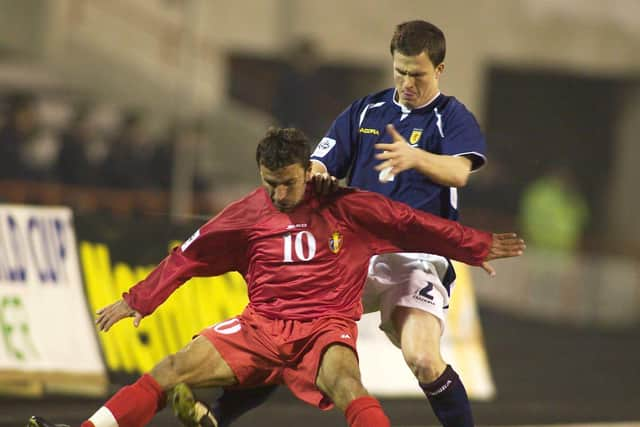Moldova v Scotland 2004: No hiding place for Berti Vogts and 'abused' Scotland players on last trip to Chisinau


Inside this folder is the anatomy of a breakdown in relationship(s). Between Berti Vogts and the Scottish fans, between the Scotland team manager and his communications officer, the role in which Mitchell served for a decade between 1997 and 2007, and, eventually, between the former German World Cup star and his then employer, the Scottish FA.
Scotland’s only previous visit to Moldova prior to tomorrow night’s return to Chisinau was undeniably eventful. “Memorable for all the wrong reasons,” is how Mitchell terms it.
Advertisement
Hide AdAdvertisement
Hide AdHe can still recall the involuntary shudder that ran down his spine as Scotland fell behind to Serghei Dadu’s opener in freezing conditions in a World Cup qualifier 17 years ago to ramp up the pressure on Vogts.


Mitchell knew things were going to become even more fraught, and even though Scotland equalised three minutes later through Steven Thompson, being unable to then go and win the game against a team then ranked 113 (they are 181 now) simply encapsulated what a laboured enterprise Scotland had developed into under Vogts.
They were not helped by suspensions, injuries and a rutted playing surface at the Republican Stadium. According to Glenn Gibbons, the then chief football writer at The Scotsman, Scotland’s play was much as would be expected on a field that “would seem like a des res to entire colonies of moles”. Fortunately for Steve Clarke, the stadium has since been demolished. His side will play in the modern, 11,000 capacity Zimbru Stadium.
While the Scots have to cope without Lyndon Dykes tomorrow, Vogts was deprived of both strikers who had started the 1-0 defeat to Norway a few days earlier. The banned James McFadden and Paul Dickov were replaced by Thompson and Stevie Crawford.
Vogts himself was not permitted in the dugout after being sent to the stand at Hampden, incurring an automatic one-match suspension after persistently protesting about a shot from Richard Hughes that he claimed had crossed the line.


Replays were at best inconclusive. However, Vogts marched around his technical area with his hands stretched out wide in the manner of a fisherman recording the measurements of the one that got away. Among the first challenges awaiting Scotland in Moldova was finding somewhere for their manager to sit.
“There was basically no place allocated for him,” recalls Mitchell. “It was an antiquated old stadium and the Moldovans said he would have to sit in the main stand. But the dressing room side was opposite the main stand, so he wanted to be close to the team. That was a fan area. If you see the pictures he is surrounded by fans, some Scotland, some Moldovan. He had no choice.” It meant he was a sitting duck for supporters’ invective.
“The whole night was challenging for a multitude of reasons,” continues Mitchell. He, too, found himself being berated by some members of the travelling support after he was ordered by the Moldovan authorities to remove the banners that had been laid out on the running track by fans. This area was where the military band was due to perform the anthems.
Advertisement
Hide AdAdvertisement
Hide Ad“It was bitterly, bitterly cold for a start," recalls Mitchell now. "The Tartan Army were in a furious mood because the first two games had been 0-0 (v Slovenia) and 0-1, so they were out of for blood. They had given up on Berti.”


There was no hiding place. Not from the crowd, not from the press. There were 26 print journalists in situ in Chisinau in 2004. Due to a combination of factors, including the changing media landscape, that is around 18 more than will chronicle the team’s success or otherwise tomorrow. Covid restrictions also means there is a limit to the number of reporters and photographers. That wasn’t the problem 17 years ago. Virus or no virus, Vogts just didn’t want them around. Relations had long since turned fractious.
“We arrived in Moldova on the Tuesday and had a training session at the stadium, which had been confirmed on the trip schedule as being open to media for the first 15 minutes,” remembers Mitchell. “But Berti said no press, no photos. I had to tell the press photographers: 'sorry, you cannot come in'.
“The photographers found that because it was a very open stadium, they could climb up the stairs at one end and stand at the top of the terracing. It was immediately spotted. Go and tell them to go, he told me.
“By this time, I was hacked off with Berti. I dutifully went over and stood there waving my arms around saying, ‘you have to go now’. But I also said, 'if I stand here for five minutes waving my arms around that will give you long enough to finish taking your photos'. They got their pictures.”
As now, Scotland needed a win. Unlike now, with victory securing a World Cup play-off spot, the three points were required simply to revive hopes of qualifying for Germany 2006. They were already wilting just two games in. Even a genuinely historic achievement became submerged amid the gathering gloom.
Although it barely rated a mention due the subsequent fallout, centre-half pairing Gary and Stephen Caldwell had become the first set of brothers to play for Scotland since Jock and David Shaw against Switzerland in 1946. “It is a bitter-sweet memory,” says Steven, now a television pundit based in Toronto.
He would further distinguish himself by winning 12 caps across ten years under five different managers. This was the last under Vogts, however. “It was still special for us, even though the result did not go well,” he says. “And then it got a bit messy as well at the airport…”
Advertisement
Hide AdAdvertisement
Hide AdTravelling fans had formed an unwelcoming party. A member of the Scotland party was spat on. “We have all seen things in our careers, we were not like little boys,” says Caldwell. “But I remember the security guy warning us that there were a few people at the airport a little bit angry, so be ready.
“And we were thinking: 'Oh well, it will be fine'. All of a sudden we got there, and they were all lined up, giving it to mostly Berti but it felt like all of us were being abused.
“It was one of the toughest things I went through actually, because your club stuff is what it is, but, at international level, you take it to heart. There is nothing better than playing for your country.”
While this should indeed be true, the perception was that Vogts’ reign had cheapened this privilege. Caps were being thrown around like confetti. He handed debuts to as many as 40 players, including Warren Cummings, Robbie Stockdale, Gareth Williams and Scott Dobie. On the other side of the spectrum, he gave Craig Gordon his first cap and persisted with him amid supporter uncertainty that tends to be easily forgotten now as the veteran goalkeeper prepares to win his 63rd cap back in Chisinau.
Whether they were established or not, players seemed to find Vogts’ methods a little unsettling. Some firmly rejected his unusual policy of allowing an alcoholic drink on the eve of games while others were tempted to abuse it. Communication was an issue throughout his reign although it was not just the language barrier that meant Vogts and Mitchell were barely on speaking terms by the time they pitched up in Moldova, in its then very obvious post-Soviet guise.
“It was a grey, dour place,” says Mitchell. “Even the dressing room in the stadium was like a grandmother's sitting room with some battered armchairs and a sofa and a few hooks on the wall.”
It was a suitably down-at-heel setting for Vogts’ reign to draw to an end, just short of a year after a 6-1 Euro 2004 aggregate play-off defeat to Holland.
All that was left was the protracted dance around the pay-off terms. One tabloid splashed with a teasing “He’s Leaving!” headline before admitting in smaller lettering below that this was only from the front door of his Glasgow home to fetch the messages. Such doorstepping and the reaction of some fans in Chisinau was why Vogts insisted that every word of a 1000-word plus statement was included on the SFA website when his departure was finally announced, over two weeks after his last game in Moldova.
Advertisement
Hide AdAdvertisement
Hide AdIn it he mentioned the malign influence of the press and a “tiny section of supporters”. This farewell to Scotland ended with a very Vogts flourish.
“Good luck boys,” he signed off.
Get a year of unlimited access to all The Scotsman's sport coverage without the need for a full subscription. Expert analysis of the biggest games, exclusive interviews, live blogs, transfer news and 70 per cent fewer ads on Scotsman.com - all for less than £1 a week. Subscribe to us today
Comments
Want to join the conversation? Please or to comment on this article.